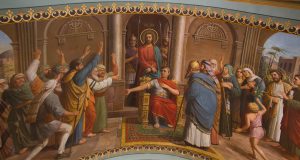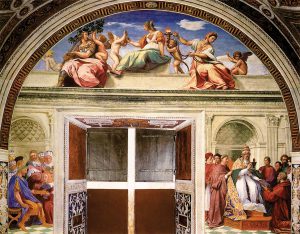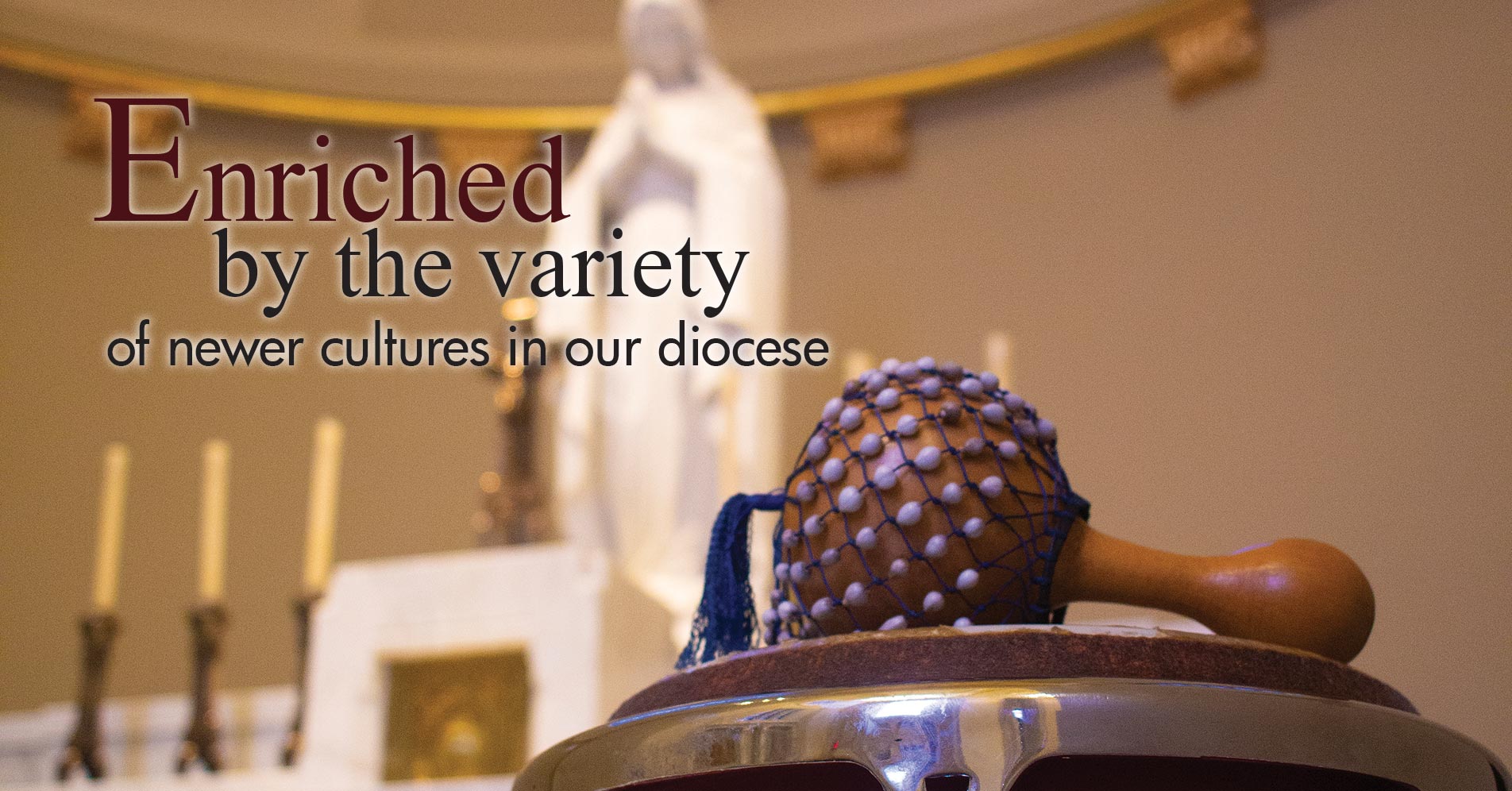
The universality of the Catholic faith on display
The more than 35,000 square miles east of the Missouri River in South Dakota have been inhabited by human beings for several thousand years. There was a long tradition of the Dakota people and their culture on these prairies. And in the last 150 years, cultures from various backgrounds, primarily European, came seeking opportunity, work and livelihood.
The same motive – seeking opportunity, work and livelihood – applies to a broad range of cultures newer to what is now the Diocese of Sioux Falls and they come from all parts of the world.
“We came to work,” said Xochitl Valencia, who with husband Victor have been here since the early 1980s. “We were young and saw opportunities,” she said. They have raised their family here, all six children attending Catholic school; the youngest will graduate from O’Gorman in two years.
If you want a sense of the universality of the Catholic faith, you can find it right here in the Diocese of Sioux Falls.
The list of Catholic communities who now live, work and worship in the Diocese of Sioux Falls is impressive. The list from the Cathedral of St. Joseph alone includes Sudanese, Eritrean (Kunaman), Burundi, Vietnamese, Hispanic and people from India, the Philippines and elsewhere.
At Our Lady of Guadalupe, where the Valencias are members, there are Catholics who have moved here from Mexico, Guatemala, El Salvador, Cuba and other central and South American countries.
At St. Lambert, Sioux Falls, you will find Karenni from Burma, and at Holy Trinity, Huron you will find a community of Karen, also from Burma.
Scattered in parishes all across the diocese you will find families new to this part of the world who are here to escape persecution, who fled war or terror or who saw opportunities for their families.
It repeats a pattern laid down with the pioneers and the waves of immigrants from Ireland, Bohemia, Poland, Luxembourg, Germany, Scandinavia, and other countries where religious intolerance or the lack of opportunity forced people to look elsewhere.
Both the challenges and the joys faced by the newer cultures, whichever century they arrived here, are strikingly similar. Issues of language, loneliness, and loss from what and who they left behind, offset by the opportunity and faith in God that they are doing his will.
Chi Tran fled by boat, seeking to leave behind the Communist regime in Vietnam after the fall of Saigon in 1975. He has been in Sioux Falls since 1980, part of a small but vibrant Vietnamese community who worships at the Cathedral of St. Joseph.
While not dismissing the challenges, Tran said faith is a common denominator.
“Our Catholic tradition or faith are very much similar with the American culture,” he said.
“There are many challenges for example, the difficulty speaking and learning English, finding jobs, limited of transportation and adapting to a new culture,” he said.
“We were born and raised as a Catholic in Vietnam; we always try to live the life according to God’s will. Sometimes we fall short. But we believe that God will forgive us and we start over each day,” Tran said.
The long-running internal strife of Burma (now known as Myanmar), which includes religious and ethnic persecution, has meant hundreds of thousands of people have fled the country. Many still live in huge refugee camps in Thailand.
Sher Nay Khin and her family were among those who fled, but they ultimately were able to come to the United States. For the last 10 years, she and husband Doh Ko have been living in Huron, where a small Karen group settled because of work opportunities.
They are members at Holy Trinity, Huron and their son is in kindergarten at Holy Trinity School. They also have an 18-month-old daughter.
In addition to all the challenges of fleeing their homeland, spending time in a refugee camp and starting over multiple times, Sher Nay said “language and understanding people” are difficult.
But they are grateful for the parish “which helps us get through,” she said. “It’s good to be able to do for your son,” she said, noting how proud she and her husband are of him.
“After 10 years it is getting better,” she said.
Fr. Paul King, now pastor at St. George, Hartford, while associate pastor at St. Lambert, Sioux Falls worked with the Karenni. He said the parish welcomed them “and has supported them by donations of clothes, furniture, and also helped the families affected by two accidents as well as providing help in dealing with the insurance and legal issues after those accidents.
“A small group of parishioners helped families with purchasing cars or houses and in medical emergencies help in areas that are new to the families are important and mean a great deal to them – letting them know that someone in the parish is there to help them navigate the hurdles or challenges. It could be something as simple as helping with bills or dealing with a car breakdown to helping with looking for a house.
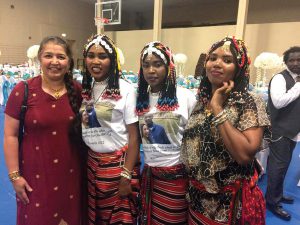
“Simple assistance with clothes or furniture donations especially for new families is deeply appreciated. These simple things are of great importance,” said Fr. King.
Dr. Poornima D’Souza has been on both sides – first as a newer arrival and now as one who assists those newer to the community. She and husband Felix, a software engineer, came to the United States through his job in the late 1990s, and to Sioux Falls for a job with Citibank in 2001.
“As regards to living here, integrating into the American society, and coping with cultural difference was a struggle,” she said.
“There were times when I was at an emotional low and wanted to return to the comfort of a loving family and familiar faces. But as time passed, I realized that out of uncomfortable situations comes the greatest learnings of life,” D’Souza said.
She pursued her doctorate in educational leadership from the University of St. Thomas, St. Paul. She has been a liaison and parent educator for the Sioux Falls School District for 15 years, and is an Adjunct Professor at Augustana University and Northwestern College teaching graduate online courses.
She has used her educational talents at the Cathedral helping newer families and communities. She and Felix help prepare all ages for sacraments, especially those getting ready for First Communion.
“Everyone has a duty to proclaim the Good News of Jesus to all. Each person is created for a particular purpose, and as Catholics, we all play a role in advancing the kingdom of God in this world. I am so privileged God has chosen me to be his instrument to teach religious education to the immigrant community in Sioux Falls,” D’Souza said.
“The Gospel exists for the entire world and the church is not confined to one culture or race or nationality and is the same Church in the United States as she is in India (the D’Souzas lived in Bangalore, India prior to coming to the US).
“The Introductory Rites, the Liturgy of the Word, the Liturgy of the Eucharist, and the Concluding Rites remain the same,” she said.
She points out that many of the same devotional practices that are popular in this country are also popular in India. “Marian devotion on Saturdays and especially during the Nativity of our Blessed Virgin Mary draws hundreds of thousands of people from all faiths. Mother Mary is considered as a Universal Mother in India… Catholics in India also look to saints especially St. Joseph on Wednesdays and St. Anthony of Padua on Tuesdays for miracles, cures, and protection,” D’Souza said.
Relying on community
Earlier immigrants from Ireland or Bohemia and elsewhere tended to find each other, to create communities that offered support in the cultural adjustments, language and other daily struggles. Parishes across the diocese still proudly reflect this heritage as an acknowledgement of how important community was to their forerunners.
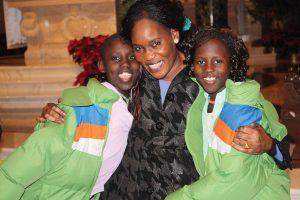
The same, where possible, is true today. Andrew Nyangamoi is a member of the Sudanese community and credits the connection of that community around St. Josephine Bakhita and the 4 p.m. Sunday Mass at the Cathedral of St. Joseph.
“The role that the Catholic faith played on us is allowing us to preserve our traditional practice and bringing up our children in Catholic faith,” he said.
“Bishop Robert Carlson (then bishop of Sioux Falls, now Archbishop of St. Louis) used to encourage us to celebrate East Festival, Christmas and Saint Bakhita in our African traditional way,” Nyangamoi said.
Now he finds himself as the more established member and has had to open his own heart to helping others who are newer.
“The big challenge that we have been facing is we are merged with other African ethnic group’s style of worship which are not much different than ours, like Kunama and Burundi.
“These groups are going through a lot of daily life challenges here in United States, unlike us who have been here 23 years. It is not easy for us to convince these but try to teach them how to be faithful, and it requires a big effort,” he said.
The creation of Our Lady of Guadalupe parish in the mid-1990s “made such a difference,” said Valencia.
Before that, it was rare to find the Mass in Spanish, harder to encourage some of the traditional prayer and family practices that she and her husband grew up with in Guadalajara, Mexico.
Again, not unlike the Czech and Polish and German traditions carried on by generations of previous immigrants, Valencia was determined that her children would know both the customs she grew up with as well as the customs of the Church and culture here in South Dakota. The parish helped with both.
“There is community now and it is such a blessing. Our Lady of Guadalupe feeds what is most important,” she said. “My Catholic faith is everything to me. It is what I stand up for. My faith is what has directed me and cared for me, it’s what fills me with joy and blessings, has been the foundation of our family,” she said.
Now one of Valencia’s goals is to help others trust in where God is leading. Sometimes that means allowing ourselves to learn about others.
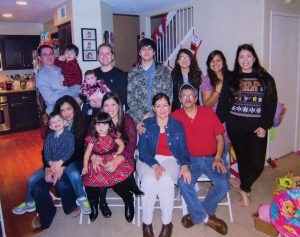
“The more we know the world of others, the better we will understand them and there is more possibility of assimilating each one as he is,” she said.
“And our world becomes wider and our priorities change. When we know more, we love more, making us free from fears,” Valencia said.
Chi Tran’s experience leads him to a similar view.
“We continue try to live and listen to God’s words. Love your neighbors, and forgive others. Always thankful of what you have in life and pray to God,” he said.
The pastor perspective
Pastors of parishes with new cultures willingly share about the positive impact on their communities and on them personally.
Fr. Kristopher Cowles said his own experience learning Spanish continues to be instructive to his work as pastor at Our Lady of Guadalupe.
“I never would have realized how difficult this was for them had I not been sent to Mexico to learn Spanish,” he said.
“While I could understand much of what was spoken to me, I often was unable to communicate the simplest needs to my host family, the other priests, or even my teachers.”
“Many of my parishioners who have come from Guatemala, El Salvador, and Mexico left the majority of their families in their countries of origin, and for some of them, they know that they will never see them again.
“When relatives and friends die, they are unable to be present and also are unable to be there for their last moments of life on this earth. The loss they feel is intense,” said Fr. Cowles.
“While so many of them were considered successful doctors or teachers in their home country, here due to the need for further training or the inability to transfer their licenses, are relegated to jobs which are unfitting for their education.
And regarding language, “while many of my parishioners are fluent in both Spanish and English, the majority of the adults do not feel comfortable speaking English even though they have studied or have been surrounded by the language constantly. It can be easy to remain around others who speak the same language as you and because of this, many Latinos never truly master English. While they would like to learn, they are busy working 8-12 hours a day and simply do not have the energy at the end of the day to work on another language,” he said.
Because faith is such a uniting factor in the lives of these newer communities, Fr. James Morgan talked about the challenge of sacramental records as he works with people at the Cathedral of St. Joseph.

“Most of the East African immigrants have spent time in refugee camps from 6 to 8 years, where baptisms, First Communions, and other sacraments took place,” said Fr. Morgan.
“In almost every situation, every ethnic group left their native country because of catastrophic situations, usually involving violence and oppression. The Kunamas were leaving their country (Eritrea) at a rate of 5,000 people a month at one point because of a despotic leader; the Sudanese because of ongoing tribal/religious war; the Vietnamese because of the communist takeover.
“These conditions engendered a protectionist attitude once they arrived to America, which is helpful to them because it keeps them together as a community, but can be a detriment to true assimilation.
“Yet it’s a beautiful thing to see, for example, when the Kunaman community meets after the Bakhita Mass for bible study, and there are 30 to 40 adults, learning their Catholic faith in their native language, only because their English is not very good at this point.
“It is both poignant and fulfilling for a pastor to witness this,” Fr. Morgan said. “They need to keep their own traditions and customs alive as a part of their identity. Irish, Czechs, Germans – assimilated in their own way on their own terms many times without losing their identity. The same holds true for the new immigrants as it did for the old immigrants.”
The pastors note the universality of the Catholic faith that is present to their parishes in a different way.
“For the Cathedral having this variety speaks to the universality of the Church, and is especially meaningful at the Mother Church of the diocese,” said Fr. Morgan.
“The world as we know it is changing. It also gives parishioners a global perspective of the world outside of Sioux Falls. They bring a very deep-rooted faith due to their circumstances that is inspiring for people of the parish
“They also bring with them life experiences that make us thankful for what we have,” he said. “We have lived in an era of relative peace. Many of these people have survived persecution, violence, oppression.
“The beauty of Catholicism, celebrating the Holy Eucharist together, is it brings us all together under the umbrella of the Church. Catholic worship transcends these perceived (and real) distinctions,” said Fr. Morgan.
Our commonly held faith “is essential as it gives a bedrock to each person that transcends where we live and allows each person to maintain an even keel even if they are uprooted by personal or political events,” said Fr. King.
“The Burmese families have this faith and that has allowed them to keep strong throughout the traumatic years of the civil war in their home regions which led to their displacement, their time in refugee camps in Thailand, and their moving to the United States,” he said.
Fr. Cowles points out that though we hold the faith in common, there are different expressions of it.
“Not every country or culture prays and worships in the same way. Each expression is rich with meaning,” he said.
“The faith within some of these cultures is so profound that it inspires others to grow in their faith, just as it challenges me to be a better priest.
“This may sound like I am speaking from my stomach, but every culture brings their own cuisine, allowing us to enjoy different flavors from multiple countries at celebrations and parish gatherings,” said Fr. Cowles.
“Different cultures were catechized in different manners, many by games or dramas. I have come to find that piñatas for instance, represent the seven deadly sins and when you destroy them, you are destroying sin but also tasting the sweetness of having achieved virtue (the candy),” he said.
The pastors also speak to their own spiritual growth as they work with these newer communities.
“While every parish has challenged me to become a better priest, in a very particular way, because everything is new or different, I have had to grow, asking God for strength to be open-minded, patient, and joyful in my ministerial role,” said Fr. Cowles.
“They have increased my reverence and love for the Eucharist reminding me that I must be in God’s grace to receive the sacrament. They have also deepened my sense that marriage is a wonderful bond that you must enter into with a true commitment. They have reminded me that not just at times of sacraments, but other moments in life are meant to be celebrated in the faith – presentations at 3 years old, quinceañeras – celebrations of 15 years of life, and other events,” he said.
Fr. Morgan speaks of sometimes feeling more like a missionary than a diocesan priest, and is inspired by it.
“More often than not, my faith has been inspired by their love for the Church, their gratitude for being able to worship freely, their incredible devotion and deep prayer life,” he said.
“For many of them, Sunday is not a day where we give on hour to God, for them, you give the whole day to God. The liturgies are particularly inspiring. There is a particular joy to the Bakhita celebrations by virtue of their traditions and customs. Mass is in English, but the music can be in Arabic, Swahili and Kunaman.
“You get a sense that they know God…they have a real relationship with Jesus. They have a particular devotion to Our Blessed Mother which is edifying,” he said.
Welcoming our brothers and sisters
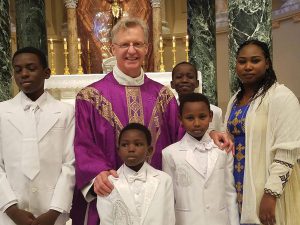
St. Joseph
What is the call to each Catholic in the Diocese of Sioux Falls with regard to the newer members?
“The people I minister to are good, hard-working, devout, faithful, Catholics who want to be accepted for who they are but certainly want to fit in as good citizens and good practicing Catholics,” said Fr. Morgan.
“They want their children to grow up with a chance in life, and they want them to know and embrace their Catholic faith. They want to embrace the values of American culture that contribute to their moral good, and avoid those aspects of American culture that they see as disrespectful and degrading. They want their children to be contributing members of society, without losing their faith to the trappings of materialism and popular fads.
“They are no different from our ancestors in that they want a chance at a new life in this country, and the freedom to practice their religion without being persecuted for it. They don’t want to be looked upon as ‘specimens’ because they dress in their traditional attire; but looked upon as true Americans and Catholics who add to the beauty of the Church Universal,” he said.
Adds Fr. Cowles, “do not be afraid of the cultural influx. America has always been a conglomeration of different cultures and identities.
“The movement of many cultures isn’t undermining our American identity but actually reminding us of our immigrant roots. Nearly all of us are children of immigrants. When we forget that, we forget who we are. They are not usurping jobs and forcing us to change but bringing new wine to old wine skins. We just need to learn how to flex in our old wine-skins,” he said.

